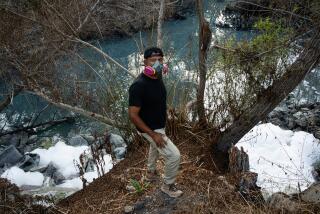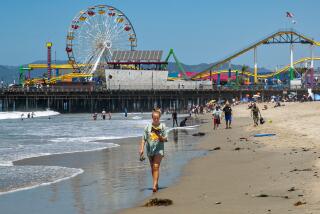Residents Say the Whole Thing Stinks
- Share via
As cleanup workers in knee boots and yellow rain gear patrolled Malibu’s beaches Monday in a bid to curtail damage from oil washing ashore, Mark Stephens prepared for the worst.
“The official line is that this spill is no big deal. But I’m not buying that,” said Stephens, who manages an apartment building near the Malibu Pier.
For people more accustomed to seeing surfers, sunbathers and celebrities occupying their beaches, the mere thought of the brown diesel-like fluid was enough to turn stomachs.
Not to mention the smell.
“You could smell it a half-mile away up in the hills,” said one woman, who, like dozens of other spectators, was drawn to the beach for a firsthand look at what was going on.
Despite assurances from Chevron officials and government agencies that the effects of the spill did not appear to be severe, few Malibu residents seemed comforted.
“I consider this a very significant spill,” said Madelyn Glickfeld, a member of the California Coastal Commission who lives in Malibu. “Just because the stuff is less visible than crude oil doesn’t mean it’s not environmentally damaging.
Indeed, as spills go, there was amazingly little to see of what did come ashore.
But that did not prevent passersby and the curious from flocking to the mile-long stretch of Surfrider Beach, where many of the 300 workers hired by Chevron to contend with the spill focused their efforts.
The workers mostly raked away kelp and debris from the beach in preparation for a possible onslaught of the oozy brown stuff that cleanup officials said would be worse if the beaches were littered.
Near the exclusive Malibu Colony at the entrance to Malibu Creek, an estuary that serves as habitat for many species of birds and fish, workers used bulldozers to create a huge earthen dam to block polluted ocean water from entering the creek.
“The big concern was whether or not the berm was going to hold against a high tide, and thus far it has,” Petty Officer Ernest Gonzalez of the Coast Guard said during the day.
Meanwhile, other workers combed the sand in pairs along a two-mile stretch, using absorbent materials to try to skim the oily substance from the beach.
Although the oily liquid could not easily be seen, one whiff was enough to tell beach-goers that something was awry.
“I got up to make coffee and my girlfriend asked if I had left the gas on the stove,” Stephens said. “I then opened the door and the fumes that gushed in off the ocean were simply overpowering. It was like a refinery out there.”
More to Read
Sign up for Essential California
The most important California stories and recommendations in your inbox every morning.
You may occasionally receive promotional content from the Los Angeles Times.













